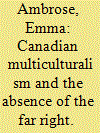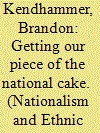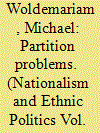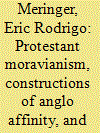| Srl | Item |
| 1 |
ID:
139809


|
|
|
|
|
| Summary/Abstract |
The far right has never been a prominent force in Canadian politics or society. Traditionally, they more resembled the North American than the West European model: ideologically dominated by right-wing populism and white supremacy, organizationally characterized by factionalism and sectarianism. The extreme right seems an almost negligible force today, in part reflecting a similar decline in the United States, while the radical right has so far been unable to build upon the recent upsurge of Islamophobia, as in Western Europe. We argue that the failure of the Canadian radical right is primarily the result of Canada's unique multiculturalism policy, which is based on a combination of selective immigration, comprehensive integration, and strong state repression of dissent on these policies. This unique blend of policies has led to a relatively low level of opposition to multiculturalism and has left little legal and political space for far right politics.
|
|
|
|
|
|
|
|
|
|
|
|
|
|
|
|
| 2 |
ID:
139806


|
|
|
|
|
| Summary/Abstract |
Although consociational-style ethnic power-sharing arrangements are frequently adopted in postconflict African states, their track record is spotty at best. Using post-civil war Nigeria (one of Africa's most durable experiments with ethnic proportionality in government), I argue that the failure of formal ethnic power-sharing in Africa is due to its intersection with the largely informal power-sharing practices characteristic of neopatrimonial political systems. In Nigeria, well-intentioned policies meant to ensure ethnic proportionality reinforce the power of patronage networks that also rely on ethnic and kinship mobilization to capture state resources. As a result, entrenched ethnic power sharing in Nigeria's federal constitution since the late 1970s has played a key role in the country's descent into corruption and poor governance.
|
|
|
|
|
|
|
|
|
|
|
|
|
|
|
|
| 3 |
ID:
139808


|
|
|
|
|
| Summary/Abstract |
Since the early 2000s, Estonia and Latvia have adopted Integration Programs aimed at dealing with issues concerning their large Russian-speaking minorities. In both cases, the meaning of “integration”—originally meant to primarily indicate the Russian speakers' route to becoming part of the Estonian and Latvian societies—was redefined to include a socioeconomic dimension. This article explores the intersection between the socioeconomic and ethnic dimensions of integration policies through the analysis of the Integration Programs and related documents and process tracing of the decision making behind them. Intertwined issues of maldistribution and misrecognition are analyzed through the two competing hypotheses of response and displacement. The analysis shows the central role of mechanisms of displacement in furthering the states' (and majority elites') ethnocentric and neoliberal agendas.
|
|
|
|
|
|
|
|
|
|
|
|
|
|
|
|
| 4 |
ID:
139807


|
|
|
|
|
| Summary/Abstract |
Under what circumstances does partition yield war between resulting successor states? This article probes the causes of the Eritrean-Ethiopian War (1998–2000) in an effort to offer tentative answers. The evidence suggests that in this particular case, the causes of postpartition war reflected a more general cause of war: disagreements over relative power. These disagreements were underpinned by the divergent historical memories maintained by ruling elites in each country about the joint revolution that brought them to power and partitioned the Ethiopian state. Based on a wide array of materials, this article contributes to debates on the comparative study of partition, while providing new insight into the origins of the Eritrean-Ethiopian War.
|
|
|
|
|
|
|
|
|
|
|
|
|
|
|
|
| 5 |
ID:
139810


|
|
|
|
|
| Summary/Abstract |
The polarized scholarly discourse of the Cold War in Central America overstated the extent to which Protestant Moravianism shaped Miskitu ethnic and cultural identity in the 20th century by defining Miskitu agency in terms of Anglo affinity and incompatibility with Hispanic culture. This exaggerated position is revealed through the hidden history of liberation theology among the Miskitu and has implications for the manner in which scholars continue to view the Miskitu-Sandinista conflict of the 1980s, Miskitu ethnic identity and history in general, and the continuing debate over the definition and implementation of Atlantic Coast autonomy in Nicaragua in a postmulticultural era.
|
|
|
|
|
|
|
|
|
|
|
|
|
|
|
|